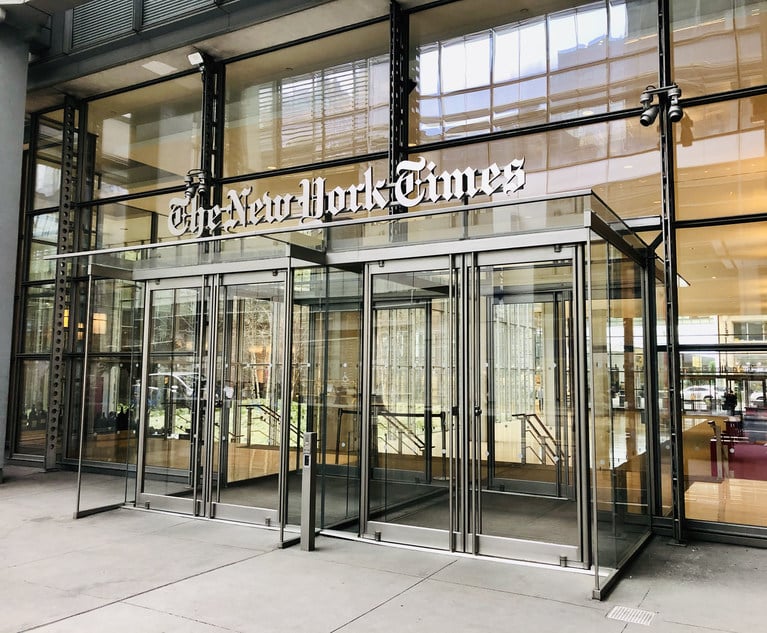 E. Barrett Prettyman courthouse in Washington, D.C. March 22, 2018. Photo: Diego M. Radzinschi/ALM.
E. Barrett Prettyman courthouse in Washington, D.C. March 22, 2018. Photo: Diego M. Radzinschi/ALM. Choose Carefully: Thinking Strategically About Venue When Mounting Agency Rule Challenges
The traditional view that the D.C. Circuit should be the forum of choice for petitioners challenging agency action is ripe for re-examination.
April 25, 2019 at 01:55 PM
5 minute read
The D.C. Circuit is thought of as the epicenter of federal administrative law. Due in part to this reputation, it has become the default forum for petitioners challenging agency rules or adjudications. But the traditional view that the D.C. Circuit should be the forum of choice for petitioners challenging agency action is ripe for re-examination.
For some types of agency challenges, petitioners have no venue choice to make because the D.C. Circuit is the statutorily mandated forum. For example, the Clean Air Act explicitly provides that petitions for review challenging rules promulgated under certain provisions of that statute must be filed in the D.C. Circuit. But other agency statutes provide the petitioner with a choice of forums. The Toxic Substances Control Act, for instance, permits anyone adversely affected by an Environmental Protection Agency rule listing a particular substance as toxic to file a petition for review in either the D.C. Circuit or in the regional circuit in which they reside. The Occupational Safety and Health Act offers even more venue options for any person aggrieved by a final order issued under certain provisions of that statute; they may challenge that order either in the circuit in which the violation occurred, the employer's home circuit, or in the D.C. Circuit. Similar choice-of-venue provisions exist in many other agency statutes.
These choice-of-venue provisions provide an opportunity for strategic litigation thinking that can be missed by petitioners that default to the D.C. Circuit as the traditional forum for administrative challenges. The other eleven regional circuits—each with their own body of administrative law—merit serious consideration as a superior forum for challenging a particular agency action. Since companies and advocacy groups with a wide geographic distribution often band together to mount a challenge to an agency rule, many of those regional circuits will be live options as the forum of choice for a given rule challenge. Instead of defaulting to the D.C. Circuit in such a situation, the better course is to carefully review all of the candidate circuits' precedent both on deference to agencies generally and on any issues raised by the particular rule challenge. Only then can a petitioner make an informed decision about the best circuit in which to file.
A comparison of recent cases from the Fifth and Ninth Circuits illustrates the range of approaches the circuits take towards agency deference. In Oregon Restaurant and Lodging Association v. Perez, the Ninth Circuit addressed a Department of Labor rule that governed employers' treatment of employee tip pools under the Fair Labor Standards Act. The Ninth Circuit first distinguished potentially dispositive circuit precedent that would have foreclosed extending deference under Chevron v. Natural Resources Defense Council and doomed the rule. After surmounting that initial hurdle, the Ninth Circuit embraced a robust view of Chevron deference, describing it as “a generous standard.” Concluding that the statute was silent on the specific issue addressed in the Department of Labor's rule, the Ninth Circuit looked to legislative history and invoked Congressional intent to uphold the Department of Labor's rule as a permissible interpretation.
The Fifth Circuit took a decidedly divergent approach to agency deference when it recently struck down a different Department of Labor rule—the Fiduciary Rule—in Chamber of Commerce of the United States of America v. Department of Labor. Among other changes, that regulation expanded the reach of ERISA's fiduciary duties to encompass “virtually all financial and insurance professionals who do business with ERISA plans and IRA holders.” The Fifth Circuit applied the Chevron framework, but its analysis of the Fiduciary Rule was nevertheless quite rigorous. It first held that the Fiduciary Rule violated ERISA's plain language. Then, taking a belt-and-suspenders approach to Chevron, the court went on to articulate seven distinct ways in which the Department of Labor's interpretation of ERISA was unreasonable and arbitrary. Also of note is footnote 14 of the opinion, in which the Fifth Circuit pointed out that, although it is still bound by Chevron, the wisdom of applying that level of deference to agencies “has been questioned on substantial grounds.”
The narrow point is that Fifth Circuit's recently expressed skepticism of overly deferential review of agency rulemaking marks it out as a court worthy of particularly close consideration as the forum for a challenge to agency action. But that serves to underscore the broader point that venue matters, and when the governing statute offers a choice of venues, savvy litigants should embrace that opportunity for strategic thinking at the very outset of a case. By engaging in this strategic thinking on the front end of an agency challenge rather than defaulting to the D.C. Circuit, a petitioner can place itself in the best position to succeed.
Mark Little is a senior associate and Travis L. Gray is an associate at Baker Botts. Their practices both focus on appellate litigation.
This content has been archived. It is available through our partners, LexisNexis® and Bloomberg Law.
To view this content, please continue to their sites.
Not a Lexis Subscriber?
Subscribe Now
Not a Bloomberg Law Subscriber?
Subscribe Now
NOT FOR REPRINT
© 2025 ALM Global, LLC, All Rights Reserved. Request academic re-use from www.copyright.com. All other uses, submit a request to [email protected]. For more information visit Asset & Logo Licensing.
You Might Like
View All
New York Times Moves for $100K in Attorney Fees Against Dfinity Foundation
3 minute read
Split 4th Circuit Revives Constitutional Challenge to Child Vaccine Mandate


'Erroneous Assumption'?: Apple Challenges DOJ Antitrust Remedy in Google Search Monopoly Case
3 minute readTrending Stories
- 1'Pull Back the Curtain': Ex-NFL Players Seek Discovery in Lawsuit Over League's Disability Plan
- 2Tensions Run High at Final Hearing Before Manhattan Congestion Pricing Takes Effect
- 3Improper Removal to Fed. Court Leads to $100K Bill for Blue Cross Blue Shield
- 4Michael Halpern, Beloved Key West Attorney, Dies at 72
- 5Burr & Forman, Smith Gambrell & Russell Promote More to Partner This Year
Who Got The Work
Michael G. Bongiorno, Andrew Scott Dulberg and Elizabeth E. Driscoll from Wilmer Cutler Pickering Hale and Dorr have stepped in to represent Symbotic Inc., an A.I.-enabled technology platform that focuses on increasing supply chain efficiency, and other defendants in a pending shareholder derivative lawsuit. The case, filed Oct. 2 in Massachusetts District Court by the Brown Law Firm on behalf of Stephen Austen, accuses certain officers and directors of misleading investors in regard to Symbotic's potential for margin growth by failing to disclose that the company was not equipped to timely deploy its systems or manage expenses through project delays. The case, assigned to U.S. District Judge Nathaniel M. Gorton, is 1:24-cv-12522, Austen v. Cohen et al.
Who Got The Work
Edmund Polubinski and Marie Killmond of Davis Polk & Wardwell have entered appearances for data platform software development company MongoDB and other defendants in a pending shareholder derivative lawsuit. The action, filed Oct. 7 in New York Southern District Court by the Brown Law Firm, accuses the company's directors and/or officers of falsely expressing confidence in the company’s restructuring of its sales incentive plan and downplaying the severity of decreases in its upfront commitments. The case is 1:24-cv-07594, Roy v. Ittycheria et al.
Who Got The Work
Amy O. Bruchs and Kurt F. Ellison of Michael Best & Friedrich have entered appearances for Epic Systems Corp. in a pending employment discrimination lawsuit. The suit was filed Sept. 7 in Wisconsin Western District Court by Levine Eisberner LLC and Siri & Glimstad on behalf of a project manager who claims that he was wrongfully terminated after applying for a religious exemption to the defendant's COVID-19 vaccine mandate. The case, assigned to U.S. Magistrate Judge Anita Marie Boor, is 3:24-cv-00630, Secker, Nathan v. Epic Systems Corporation.
Who Got The Work
David X. Sullivan, Thomas J. Finn and Gregory A. Hall from McCarter & English have entered appearances for Sunrun Installation Services in a pending civil rights lawsuit. The complaint was filed Sept. 4 in Connecticut District Court by attorney Robert M. Berke on behalf of former employee George Edward Steins, who was arrested and charged with employing an unregistered home improvement salesperson. The complaint alleges that had Sunrun informed the Connecticut Department of Consumer Protection that the plaintiff's employment had ended in 2017 and that he no longer held Sunrun's home improvement contractor license, he would not have been hit with charges, which were dismissed in May 2024. The case, assigned to U.S. District Judge Jeffrey A. Meyer, is 3:24-cv-01423, Steins v. Sunrun, Inc. et al.
Who Got The Work
Greenberg Traurig shareholder Joshua L. Raskin has entered an appearance for boohoo.com UK Ltd. in a pending patent infringement lawsuit. The suit, filed Sept. 3 in Texas Eastern District Court by Rozier Hardt McDonough on behalf of Alto Dynamics, asserts five patents related to an online shopping platform. The case, assigned to U.S. District Judge Rodney Gilstrap, is 2:24-cv-00719, Alto Dynamics, LLC v. boohoo.com UK Limited.
Featured Firms
Law Offices of Gary Martin Hays & Associates, P.C.
(470) 294-1674
Law Offices of Mark E. Salomone
(857) 444-6468
Smith & Hassler
(713) 739-1250










